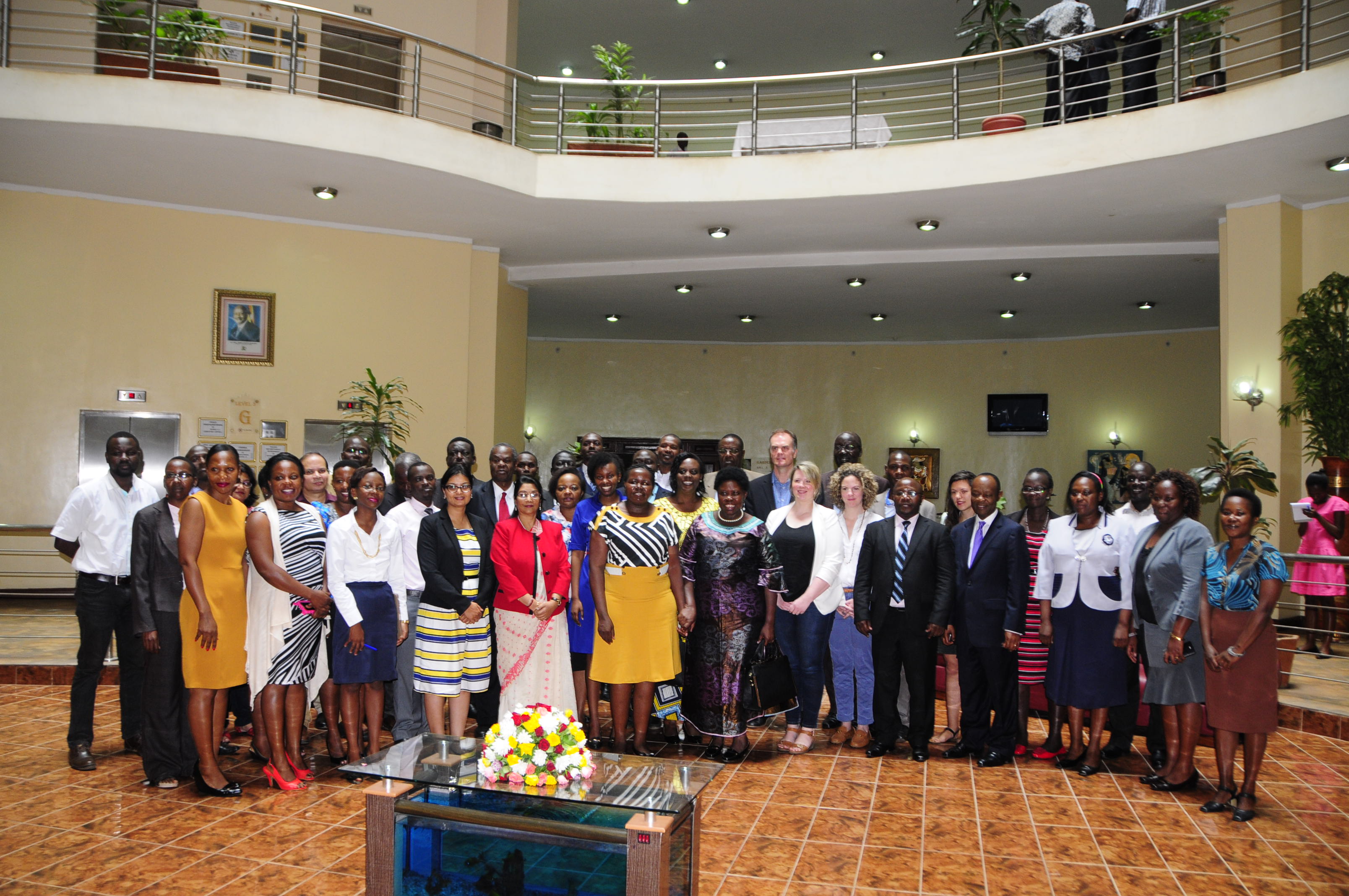Innovative research approaches to inform maternal and child health policy in uganda
The number of women who die from pregnancy and childbirth-related complications in Uganda has declined in the last five years -- from 430 to 336 per 100,000 live births. To ensure that progress is sustained, members of the Eastern Africa Health Policy Research Organization consortium are undertaking research on the value and cost effectiveness of social enterprise models and incentives for community health workers (CHWs).
Efforts to enrich the body of evidence for human resources for health has spurred interest among high-profile government officials as was confirmed during a stakeholders’ meeting co-hosted by APHRC and BRAC Uganda in Kampala on 1 June. Uganda’s Minister of State for Health (Primary Health Care) Hon. Joyce Kaducu, who was the guest of honor, said: “We can reduce maternal mortality by eliminating the inequalities that lead to disparities in access and quality of care.” Existing Maternal, Newborn and Child Health (MNCH) policies either need to be strengthened or enforced to ensure that all women access quality maternal services. This formed the heart of the discussions that brought together nearly 50 participants representing the ministry of health, members of parliament, academia and non-state actors.
Commitment and endorsement from the high-level government officials provided a well-deserved boost for the researchers who, through the relationships built will be able to utilize their research to inform policy. Urging all participants to reflect on how research could inform and improve interventions in the community as well as MNCH decisions and policies across the country, Hon. Kaducu added: “Credible evidence is necessary in policy-making and we encourage research professionals to lead on this issue.”
Echoing Hon. Kaducu’s commitment to advance evidence-informed policy-making, Dr. Henry Mwesaba, the director of health services, pledged that researchers would be included in key MNCH committees such as the national maternal and child health technical working group. This will provide an important platform for the two research teams working in Uganda as part of the Innovating for Maternal and Child Health in Africa (IMCHA) initiative to disseminate their findings and share recommendations for how they can inform decision-making.
The World Policy Institute estimates that in Uganda, there is one doctor for every 24,000 citizens, fewer than WHO’s recommended ratio of 1:1000. This signifies chronic shortage of trained medical personnel to respond to health needs of its population resulting to 16 women losing their lives every day from childbirth related complications.
Low levels of trained professionals mean that the roles played by community health workers in raising awareness about the importance of antenatal care and skilled assistance during delivery are vital to a community’s overall health and wellbeing. However, many programs that engage CHWs are piecemeal and ad hoc, which ultimately compromises quality of care. Uganda, like many other countries in sub-Saharan Africa, needs a more structured, systematic approach to effectively and sustainably engage CHWs, ensuring that they are adequately incentivized and trained to provide the highest quality of care possible.
Together with partners from Cape Breton University in Canada, BRAC Uganda is running a three-year investigation of different interventions and models of management for CHWs. The aim of the research is to assess the value and cost effectiveness of models that can be used to motivate community health workers while also improving performance.
This research is particularly timely, as Uganda seeks to implement a new Community Health Extension Workers (CHEW) strategy, which aims to balance the need for a system to guide CHW compensation against the reality of a fragmented approach to their work in communities, particularly rural and remote ones.
Uganda’s health ministry developed the CHEW strategy in 2016 and has been successively introducing components of it as resources allow. Costs for implementing the entire strategy are estimated to exceed $100 million: a hefty price tag for a country that spends an average of $17 per person on publicly funded health care.
“The estimated cost for rolling out the CHEW strategy is not just for incentives but also training. The CHEWs will work with village health teams who are working on voluntary basis and we welcome suggestions on how best to motivate them,” said Dr. Paul Kagwa, a commissioner in the Ministry of Health.

BRAC researchers hope that their evidence will be able to help guide a smarter and more equitable implementation of the CHEW strategy, while also ensuring improved monitoring and evaluation of CHW performance and impact. “Since the stakeholders' meeting, we have strengthened our relationship with the Ministry of Health and gained more contacts. We now get invited to participate in technical working groups for maternal and child health. We hope to deliver a presentation about our IMCHA supported research project this September at the Maternal and Child Health Cluster meeting,” said Jenipher Twebaze, the lead researcher for the IMCHA-supported project by BRAC Uganda.
The other project supported by the IMCHA program in Uganda addresses the complex healthcare needs of women and children in conflict-affected areas such as northern Uganda, and South Sudan, both of which are regularly strafed by violence. To address this, researchers from St. Mary’s Hospital Lacor in Gulu, northern Uganda, are working with South Sudan’s Torit State Hospital and Ministry of Health to link communities from affected regions to health services. The team is engaging communities to identify their challenges in accessing maternal services and how these can be addressed. They are also strengthening the capacity of midwives to provide better services at the community level.
Researchers also used the high-profile meeting to identify where they would bring evidence to inform in future decision-making.


